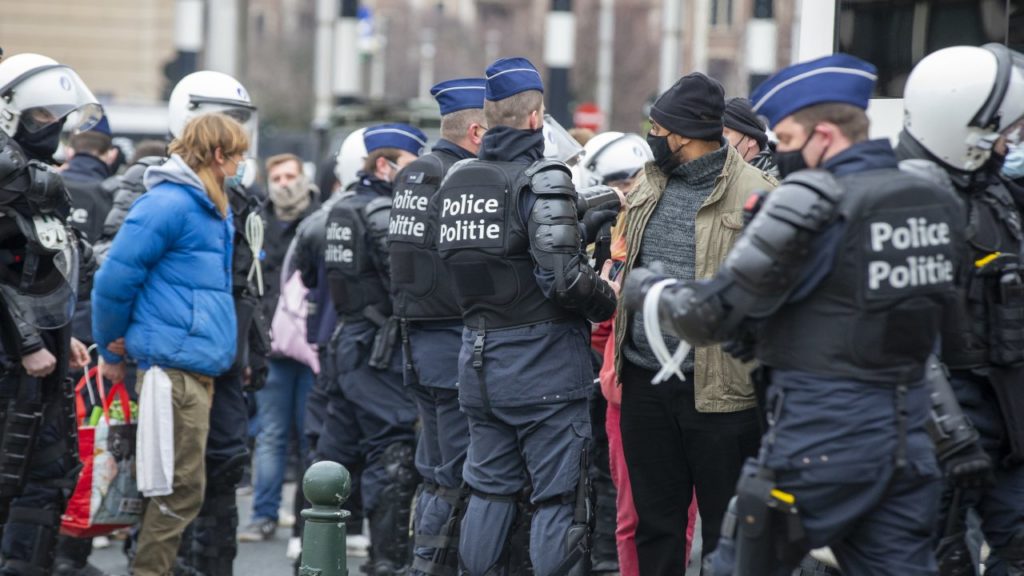On Sunday the 31st of January, Brussels police and the City of Brussels refused to grant protesters any formal permission for a planned demonstration against government-imposed Covid-19 measures.
Covid-19 has brought numerous people to the brink of a fundamental “bankruptcy of living”. Mundane misunderstandings can, in many ways, no longer be conquered by a communal handshake. Given that ‘higher powers’ tend to dismiss us from even our most basic needs, it would seem as though the people have deliberately been overshadowed during any authoritative decision-making.
Money, school, work, friends… all these things have been stripped from our already empty hands, and we are slowly running out of resources to efface our earnest burdens. Still, in the midst of this fire, we are somehow able to keep our seething animosity at bay. Smile the invisible smile behind a white and blue mask.
At this moment, it is well-known that common social disparities have been amplified by the coming of a ‘prejudiced’ virus – one that kills some and spares others. For instance, it has severely stretched the ever-widening gap between rich and poor, specifically between low and tertiary-educated. In addition, by virtue of widespread medical knowledge, experts have roughly identified the boundaries of a ‘natural’ imbalance. Where the youth is safe, elders might be vulnerable. Where the fit can stand, the obese might be at risk. Contrary to scientific observation, government policies demand us to feign as if we are all ONE – the weakest. It is against this background, the altruistic creed of communal fidelity, that we ought to place ourselves. All of us.
If such a binding fabric is merely a superficial construct, aimed to extinguish a further effectuating of any underlying inequalities, how is it than in any way capable of doing so? Are we really to believe that the benevolent workings of a parliamentary democracy requires us to abandon our self-interests altogether? In other words, do policymakers have the right to infringe on our constitutional liberties?
One can hardly deny that the prevention of pain is a worthy cause. Besides, the very notion of temporal punishment exists because of the customary belief that it can indeed prevent ‘something bad’ from happening again in the future – from failure to crime. However, one has to note that the lawful prevention of further Covid-19 infections cannot adequately be pursued until all is known about the transmission of the virus – possible risk is not enough to morally bring about an extensive breach of civil rights. To convict a murderer, he must first be known to have murdered.
Considering this, those in charge must truly have faith in their methods if they are willing to lock away senior citizens during their last days among the living.
Quantity over quality fabricates the general logic behind the “preservation of life”. The time which has flown by ought to be seen as a necessary sacrifice so that we, eventually, may all continue living like before. By that logic, we are currently tying a psychological knot between past and future – the future is all we should think about.
Be that as it may, humanity has by no means remained untouched by the profound tragedies around us. As a result, some might argue that the time for moral make-believe has passed. That one must move towards the center of “the circle of moral concern” and embrace ‘evil’ as if it is a tool to save oneself from a precarious situation.
Strangely enough, employing amoral initiative as a means to conserve overall domestic wellbeing is the same ‘Machiavellian’ approach as is used by governmental institutions today. As weird as that may sound, it certainly does not have to be a bad thing. Perhaps, the handling of the coronavirus is no moral struggle, but a duty-bound effort to provide for the well-being of all citizens while simultaneously expelling the virus. If this is truly the primary goal, then the usage of instrumental reason and power – fines, jail time, etc. – to limit the liberties as well as the dangers must be a virtuous deed, right?
We demand of our politicians a high standard. And, during this time, it is in our own interest to keep it that way. Let the students, the youth, the elderly and everybody else complain so that they may be heard. Collective efficiency is our most effective weapon to strive for a better time. New policies must come in order to, once again, make way for our own interests. In the meantime, it is the government’s duty to ensure that ‘normal’ life does not come too early, and it is ours to prevent it from coming too late. Whether organizing, or preventing, a physical protest should be the imperative undertaking of a single party, I will leave that up to you.
Still, like a reflective equilibrium, person and policy must find a proper balance – unlike the extremely ill-defined relation between unyielding right and dispensable entitlement. One can’t simply keep relying on the increasingly fading trust in communal fidelity to tie up the raving masses. At this point, it is in no-one’s favor to denigrate cries for help for the sake of structural convenience. Don’t just sit still and wait for sudden relief; make noise, together and alone, so that we may create a new sense of community from within ourselves. It will be stronger than ever!

